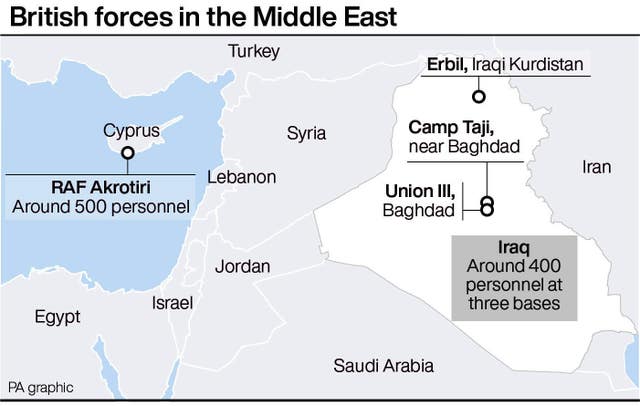
Downing Street has sought to distance itself from Donald Trump’s threat that Iranian cultural sites could be targeted amid heightening tensions in the Persian Gulf.
The US president has refused to back down after raising the prospect of targeting such sites over the weekend, following his decision to assassinate the Iranian military chief Qassem Soleimani.
Number 10 pointed to laws preventing the destruction of cultural heritage when asked if Boris Johnson supported Mr Trump’s comments.
“There are international conventions in place that prevent the destruction of cultural heritage,” the Prime Minister’s official spokesman told a Westminster briefing.
Foreign Secretary Dominic Raab reiterated the message, telling reporters: “We have been very clear that cultural sites are protected under international law and we would expect that to be respected.”
It came after Mr Johnson, Emmanuel Macron and Angela Merkel issued a joint statement calling on all sides to work towards an urgent easing of tensions in the region.
The European leaders said that while they were concerned by the “negative” role Iran has played in the region – including through forces directed by Gen Soleimani – there was now “an urgent need for de-escalation”.
Downing Street insisted Britain’s security partnership with the US remained “very close” despite Mr Trump not informing the UK of its plans to assassinate the general – adding that the UK is in “regular dialogue at every level”.
Mr Johnson spoke to the Iraqi prime minister Adel Abdul-Mahdi on Monday morning, and there will be a meeting of the National Security Council on Tuesday.
These Media Posts will serve as notification to the United States Congress that should Iran strike any U.S. person or target, the United States will quickly & fully strike back, & perhaps in a disproportionate manner. Such legal notice is not required, but is given nevertheless!
— Donald J. Trump (@realDonaldTrump) January 5, 2020
A Number 10 spokeswoman said the two leaders “discussed the need to de-escalate tensions in the region following the death of Qassem Soleimani and agreed to work together to find a diplomatic way forward”.
“The Prime Minister underlined the UK’s unwavering commitment to Iraq’s stability and sovereignty and emphasised the importance of the continued fight against the shared threat from Daesh,” they added.
Ministers are urging the Iraqi government to allow foreign troops to remain in the country to fight against the threat posed by so-called Islamic State, despite its parliament calling for their expulsion.
And the British Government is “urgently speaking to partners about next steps” after Iran’s “extremely concerning” announcement that it will abandon the limits in the unravelling nuclear deal on fuel enrichment, its uranium stockpile and research activities.

Around 400 UK troops are stationed in Iraq in the fight against IS, while the US has 5,200, prompting fears of a withdrawal that could cripple the battle against the terror group.
Nato secretary general Jens Stoltenberg announced on Monday afternoon that the alliance’s forces have suspended training in Iraq.
Mr Johnson assembled key ministers – including Mr Raab and Defence Secretary Ben Wallace – as well as senior officials including the Cabinet Secretary Sir Mark Sedwill to discuss the crisis.
Mr Raab said: “Clearly our first priority is to make sure that UK nationals, citizens, shipping, diplomatic missions and military personnel are safe.
“We’ve changed our travel advice, we are going to be reinforcing in due course the Royal Navy protection for shipping in the Strait of Hormuz.”
Mr Raab – who spoke to his Iranian counterpart Mohammed Javad Zarif on Monday – said the UK was stressing the importance of “de-escalating the tensions and finding a diplomatic way through this crisis” in talks with world leaders and foreign ministers.
But he echoed Mr Johnson’s view that the UK would not “lament” Gen Soleimani’s death.
“General Soleimani was a regional threat, he had a track record, that was his job description,” Mr Raab said. “I don’t think we will – as the Prime Minister said – lament his passing.”
Elsewhere, The Times quoted an unnamed senior commander in the elite Quds Force, which Gen Soleimani commanded, as warning British soldiers could be fatally attacked as collateral.
“Our forces will retaliate and target US troops in (the) Middle East without any concern about killing its allies, including UK troops, as this has turned in to a fully-fledged war with much collateral damage expected,” the commander said.
As the Ambassador and high representative of my country in the UK, I strongly condemn the vicious lie and provocative news by #Times today. I will ask the concerned UK authorities to take swift action to stop such malicious false propaganda in this very sensitive time. pic.twitter.com/LVMPUJH79s
— Hamid Baeidinejad (@baeidinejad) January 6, 2020
Iran’s ambassador to the UK, Hamid Baeidinejad, dismissed the report as “malicious false propaganda”.
He tweeted: “As the Ambassador and high representative of my country in the UK, I strongly condemn the vicious lie and provocative news by #Times today.
“I will ask the concerned UK authorities to take swift action to stop such malicious false propaganda in this very sensitive time.”


Comments: Our rules
We want our comments to be a lively and valuable part of our community - a place where readers can debate and engage with the most important local issues. The ability to comment on our stories is a privilege, not a right, however, and that privilege may be withdrawn if it is abused or misused.
Please report any comments that break our rules.
Read the rules hereLast Updated:
Report this comment Cancel